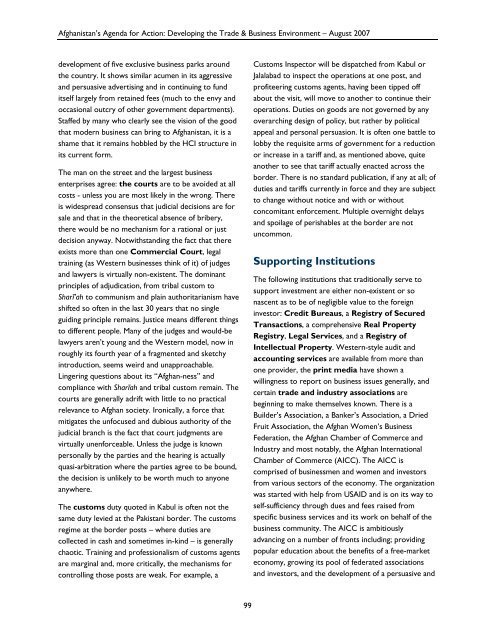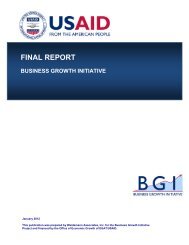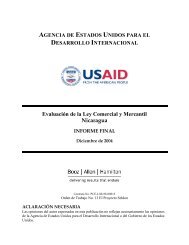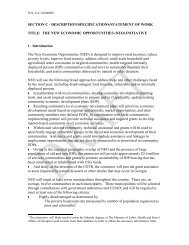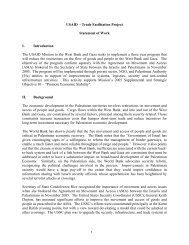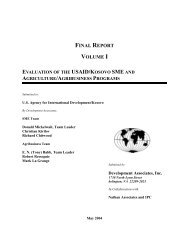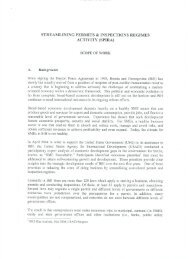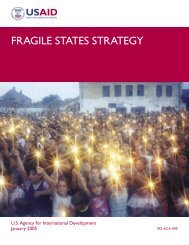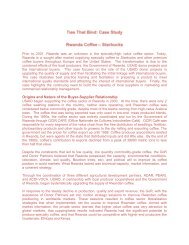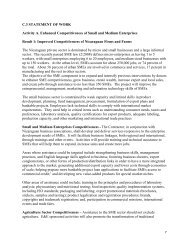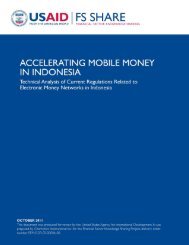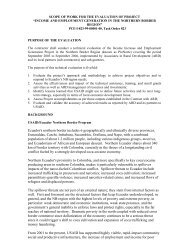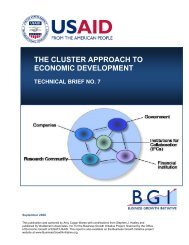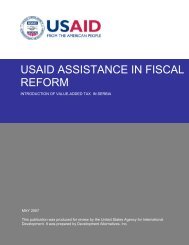Afghanistan's Agenda for Action - Economic Growth - usaid
Afghanistan's Agenda for Action - Economic Growth - usaid
Afghanistan's Agenda for Action - Economic Growth - usaid
You also want an ePaper? Increase the reach of your titles
YUMPU automatically turns print PDFs into web optimized ePapers that Google loves.
Afghanistan’s <strong>Agenda</strong> <strong>for</strong> <strong>Action</strong>: Developing the Trade & Business Environment – August 2007development of five exclusive business parks aroundthe country. It shows similar acumen in its aggressiveand persuasive advertising and in continuing to funditself largely from retained fees (much to the envy andoccasional outcry of other government departments).Staffed by many who clearly see the vision of the goodthat modern business can bring to Afghanistan, it is ashame that it remains hobbled by the HCI structure inits current <strong>for</strong>m.The man on the street and the largest businessenterprises agree: the courts are to be avoided at allcosts - unless you are most likely in the wrong. Thereis widespread consensus that judicial decisions are <strong>for</strong>sale and that in the theoretical absence of bribery,there would be no mechanism <strong>for</strong> a rational or justdecision anyway. Notwithstanding the fact that thereexists more than one Commercial Court, legaltraining (as Western businesses think of it) of judgesand lawyers is virtually non-existent. The dominantprinciples of adjudication, from tribal custom toSharī’ah to communism and plain authoritarianism haveshifted so often in the last 30 years that no singleguiding principle remains. Justice means different thingsto different people. Many of the judges and would-belawyers aren’t young and the Western model, now inroughly its fourth year of a fragmented and sketchyintroduction, seems weird and unapproachable.Lingering questions about its “Afghan-ness” andcompliance with Sharīah and tribal custom remain. Thecourts are generally adrift with little to no practicalrelevance to Afghan society. Ironically, a <strong>for</strong>ce thatmitigates the unfocused and dubious authority of thejudicial branch is the fact that court judgments arevirtually unen<strong>for</strong>ceable. Unless the judge is knownpersonally by the parties and the hearing is actuallyquasi-arbitration where the parties agree to be bound,the decision is unlikely to be worth much to anyoneanywhere.The customs duty quoted in Kabul is often not thesame duty levied at the Pakistani border. The customsregime at the border posts – where duties arecollected in cash and sometimes in-kind – is generallychaotic. Training and professionalism of customs agentsare marginal and, more critically, the mechanisms <strong>for</strong>controlling those posts are weak. For example, aCustoms Inspector will be dispatched from Kabul orJalalabad to inspect the operations at one post, andprofiteering customs agents, having been tipped offabout the visit, will move to another to continue theiroperations. Duties on goods are not governed by anyoverarching design of policy, but rather by politicalappeal and personal persuasion. It is often one battle tolobby the requisite arms of government <strong>for</strong> a reductionor increase in a tariff and, as mentioned above, quiteanother to see that tariff actually enacted across theborder. There is no standard publication, if any at all; ofduties and tariffs currently in <strong>for</strong>ce and they are subjectto change without notice and with or withoutconcomitant en<strong>for</strong>cement. Multiple overnight delaysand spoilage of perishables at the border are notuncommon.Supporting InstitutionsThe following institutions that traditionally serve tosupport investment are either non-existent or sonascent as to be of negligible value to the <strong>for</strong>eigninvestor: Credit Bureaus, a Registry of SecuredTransactions, a comprehensive Real PropertyRegistry, Legal Services, and a Registry ofIntellectual Property. Western-style audit andaccounting services are available from more thanone provider, the print media have shown awillingness to report on business issues generally, andcertain trade and industry associations arebeginning to make themselves known. There is aBuilder’s Association, a Banker’s Association, a DriedFruit Association, the Afghan Women’s BusinessFederation, the Afghan Chamber of Commerce andIndustry and most notably, the Afghan InternationalChamber of Commerce (AICC). The AICC iscomprised of businessmen and women and investorsfrom various sectors of the economy. The organizationwas started with help from USAID and is on its way toself-sufficiency through dues and fees raised fromspecific business services and its work on behalf of thebusiness community. The AICC is ambitiouslyadvancing on a number of fronts including; providingpopular education about the benefits of a free-marketeconomy, growing its pool of federated associationsand investors, and the development of a persuasive and99


